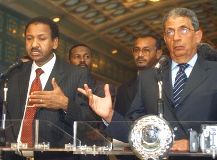Arab FMs rally around Sudan in Darfur crisis, call for more time
By Hassen Zenati
CAIRO, Aug 8 (AFP) — Arab states rallied around Sudan on Sunday in its bid to avoid United Nations sanctions over atrocities in the Darfur region, calling for an extension to a UN-imposed deadline of 30 days to resolve the crisis.
 Khartoum should be given an “adequate timeframe … to meet its commitments” to the United Nations, Arab League foreign ministers said in a declaration following an extraordinary meeting in the Egyptian capital.
Khartoum should be given an “adequate timeframe … to meet its commitments” to the United Nations, Arab League foreign ministers said in a declaration following an extraordinary meeting in the Egyptian capital.
Egyptian Foreign Minister Ahmed Abul Gheit told reporters that Sudan may need up to 120 days to bring the situation under control in Darfur, where as many as 50,000 people have died and around 1.2 million been displaced, while around 200,000 refugees languish in camps in neighboring Chad.
A UN resolution passed July 30 gave Khartoum 30 days to resolve the humanitarian crisis in the western region or face possible sanctions.
The Cairo-based Arab League, whose 22 members include Sudan, asked the international community to “reject any threat of military intervention” in Darfur.
The rebellion in Darfur erupted in February 2003 when minority tribes rose up against Khartoum to demand an equal share of national development and protection for the local population.
The revolt prompted a heavy-handed crackdown by government troops and Arab militias, known as the Janjaweed, which is accused of the bulk of the atrocities.
“The Darfur crisis is very complicated,” Abul Gheit said. “I cannot imagine that any country, even the United States, can solve this crisis within 30 days.”
Arab League Secretary General Amr Mussa announced that the organization had reached agreement with the United Nations and the Sudanese government to be part of a team monitoring Khartoum’s compliance with the resolution.
The so-called Joint Implementation Mechanism was set up during a visit to Sudan last month by UN chief Kofi Annan to insure that Khartoum was doing everything in its power to calm the situation in Darfur.
Under the deal, Khartoum agreed to facilitate the flow of humanitarian aid, rein in the pro-government militias and begin negotiations with Darfur rebels on ending the conflict.
Khartoum has notably agreed to disarm the Janjaweed, and an African Union (AU) team backed by 300 security personnel is already monitoring a shaky truce.
Mussa said the Arab League would also send a group of observers to the region to join the AU ceasefire monitors.
“Our African countries that are members in the Arab League will participate actively with the team monitoring the ceasefire, and perhaps, in an African protection force,” he said.
The two rebel movements, the Movement for Justice and Equality and the Sudanese Liberation Army, have agreed to resume talks on August 23 in the Nigerian capital Abuja under AU auspices.
Annan must submit a report to the Security Council at the end of August on the situation in Darfur.
The Sudanese authorities want the rebels to be regrouped into specified areas so that they can disarm the government-backed militias.
Foreign Minister Mustafa Osman Ismail said at the meeting, attended by 13 Arab League foreign ministers, that his country had enough troops of its own, with 40,000 deployed in Darfur.
“We do not need non-Sudanese troops. We need observers and maybe troops to protect them,” he said. “What we ask for is to reinforce the means of the government.”
The government and rebels have both sides violated a ceasefire signed on April 8, complicating efforts by aid agencies to deliver supplies to a region the size of France.
Abul Gheit said the UN resolution’s deadline could be “extended from 30 days to 90 days and 120 days”.
Annan’s envoy Jan Pronk, while describing the situation in Darfur as a “major crisis”, admitted that it would be “naive” for the United Nations to demand a resolution within 30 days.
“We demand substantial progress to assure the return of security,” he said.
He told reporters earlier: “It will be important for the government to delineate safe zones” within the 30-day period.
Pronk added that the United Nations needed the support of Arab and African states for the action plan adopted with Sudan to resolve the crisis.
“Security will not come about only through the efforts of the (Sudanese) government but also the international community, by offering financial and human support through the presence of international observers, notably Arab and African,” he said.
